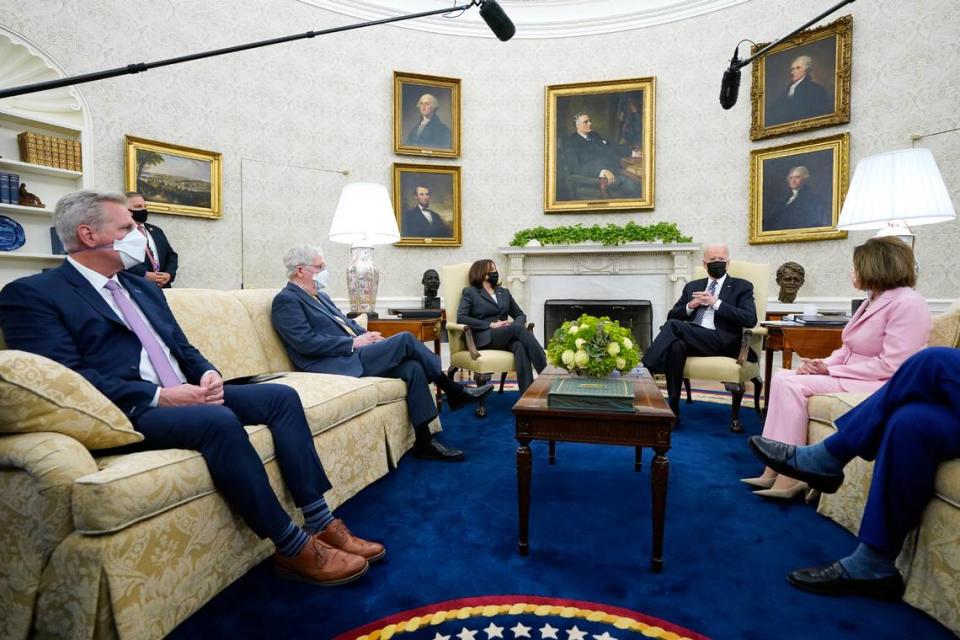McConnell cites ‘bipartisan desire’ after Biden meeting, while holding a ‘red line’
- Oops!Something went wrong.Please try again later.
- Oops!Something went wrong.Please try again later.
After his first Oval Office meeting of the year, Mitch McConnell let the other leaders do most of the talking.
He can afford to wait and see -- and choose later whether to partner or oppose.
After more than 90 minutes inside the White House with the three other top congressional leaders and President Joe Biden, McConnell said he thought both parties had a “bipartisan desire to get an outcome” on a substantial infrastructure package, the next big ticket item Congress is expected to consider this spring.
But the Kentuckian, in limited comments, was also careful to make no iron-clad commitments. And he purposefully reiterated what he wouldn’t do.
McConnell said making changes to a tax law passed by Republicans in 2017 was a “red line” for his party, ruling out any agreement to raise the corporate tax rate as Biden has proposed.
“Senate Republicans are not interested in revisiting the 2017 tax bill,” McConnell said. “I think the president and vice president understand that.”
McConnell was joined by House GOP Leader Kevin McCarthy, who spoke longer than McConnell afterward. Democratic Senate Majority Leader Chuck Schumer and House Speaker Nancy Pelosi were also in attendance.
The disagreements on a payment plan looked nearly as wide after the meeting as they did going in.
Even if Biden is willing to drop his infrastructure pricetag from more than $2 trillion to the $800 billion range that McConnell indicates he could support, the two men remain at loggerheads on how exactly to pay for new roads, bridges, airports and broadband.
The Senate GOP leader said both sides agreed to work on what spending provisions should be included in an infrastructure package, and urged the president to listen to members of his Republican conference who he says have the best insight on how to spend the money.
McConnell later suggested that some of the state and local government financial aid included in the coronavirus relief bill passed earlier this year could be funneled instead into helping pay for the infrastructure package.
“You won’t find any Republican who is going to go raise taxes,” said McCarthy. “I think that’s the worst thing you can do in this economy, when you watch inflation. Your gas is going up… you’re watching food costs go up, you’re watching housing costs, lumber costs. There’s inflation everywhere you go.”

Whether Biden or Senate Democrats will entertain any of the GOP’s suggestions will go a long way toward demonstrating if a bipartisan meeting like the one on Wednesday can still yield substantive results in a hyper-polarized Washington.
Still, history bodes well for Biden to sign some type of human-capital infrastructure plan into law during his first year. The ultimate question will be the size he craves and how many Republican votes he wants signed on to it.
“The bottom line here is we’re going to see if we can reach some consensus on a compromise,” Biden said, with the four leaders seated around him on couches.
There’s already progressive pressure on Biden to buck McConnell’s wishes entirely.
“He may be trying to walk this back now, but Democrats should believe Sen. McConnell when he said ‘100%’ of his focus is on blocking President Biden’s agenda,” said Eli Zupnik, a former Senate aide and current spokesperson for the liberal group Fix Our Senate. “President Biden and Congressional Democrats shouldn’t allow Sen. McConnell to string them along promising bipartisanship while doing everything he can to create gridlock and dysfunction that he knows voters will blame on the Democrats in charge.”
At a Capitol Hill news conference after the meeting, House Democratic leaders said they planned to bring infrastructure legislation to the floor for a vote before the July 4 break.
“The president has his vision. Congress will work its will,” Pelosi said, with the House speaker adding that she was “more optimistic” after the meeting about passing infrastructure legislation with bipartisan support. “But we’ll see,” Pelosi said.
Pelosi said the meeting “took us a few steps forward,” though electric cars were an area of “not total agreement.”
“We didn’t go through a list and say, yes on this, no on that, but that emerged as something that they might not be too fond of,” she said. “But it was by and large a very strong commitment on the part of the president that his interest in bipartisanship was sincere.”
Ahead of the meeting, McConnell took to the Senate floor to chastise Democrats for pursuing policies without Republican support.
“They used the end of the pandemic to pass what the president’s own staff admitted -- admitted -- was quote, ‘the most progressive bill in American history,’ end quote,” McConnell said, referring to the American Rescue Plan. “Not exactly shopping for consensus.”
McConnell noted that the last time Congress took comprehensive action on infrastructure in 2015, 83 senators supported final passage.
“Infrastructure can and should be a bipartisan issue,” McConnell said. “The same for supporting our national defense.”
Speaking on the floor before McConnell, Schumer also expressed a goal of bipartisanship, but with a caveat. The Democratic leader warned that given the gravity of problems the country faces, changes “cannot be small-minded and passive, we must be big and bold.”
Ahead of first Biden-McConnell meeting, a long history with low expectations

